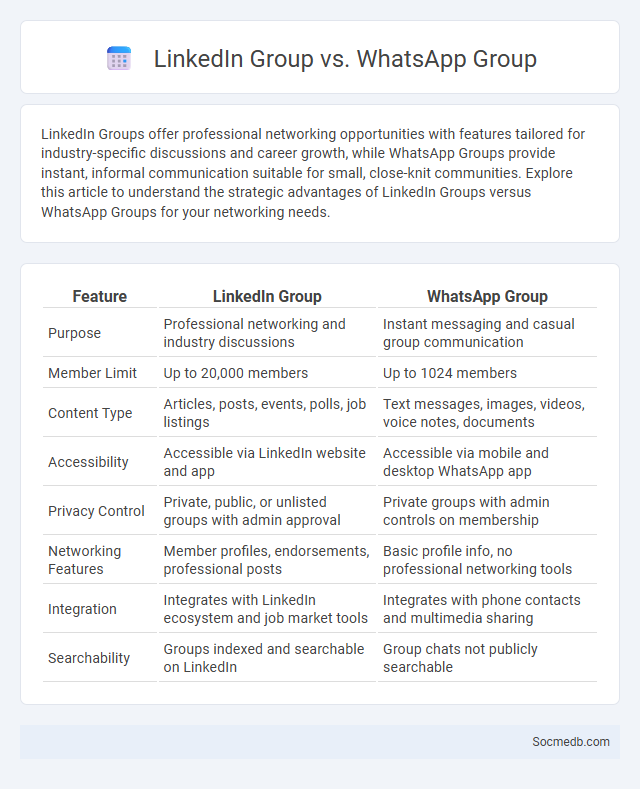
Photo illustration: LinkedIn Group vs WhatsApp Group
LinkedIn Groups offer professional networking opportunities with features tailored for industry-specific discussions and career growth, while WhatsApp Groups provide instant, informal communication suitable for small, close-knit communities. Explore this article to understand the strategic advantages of LinkedIn Groups versus WhatsApp Groups for your networking needs.
Table of Comparison
| Feature | LinkedIn Group | WhatsApp Group |
|---|---|---|
| Purpose | Professional networking and industry discussions | Instant messaging and casual group communication |
| Member Limit | Up to 20,000 members | Up to 1024 members |
| Content Type | Articles, posts, events, polls, job listings | Text messages, images, videos, voice notes, documents |
| Accessibility | Accessible via LinkedIn website and app | Accessible via mobile and desktop WhatsApp app |
| Privacy Control | Private, public, or unlisted groups with admin approval | Private groups with admin controls on membership |
| Networking Features | Member profiles, endorsements, professional posts | Basic profile info, no professional networking tools |
| Integration | Integrates with LinkedIn ecosystem and job market tools | Integrates with phone contacts and multimedia sharing |
| Searchability | Groups indexed and searchable on LinkedIn | Group chats not publicly searchable |
Introduction: Understanding Online Community Platforms
Online community platforms serve as digital hubs where users connect, share interests, and collaborate through social networks, forums, and content-sharing sites. These platforms facilitate real-time communication and engagement across diverse demographics, enhancing social interaction and knowledge exchange. Key examples include Facebook, Reddit, and Discord, each offering unique features tailored to fostering interactive and supportive online communities.
Key Features: LinkedIn Groups, WhatsApp Groups, and Niche Communities
LinkedIn Groups offer professional networking opportunities by connecting individuals with shared industry interests, enabling you to engage in targeted discussions and access valuable resources. WhatsApp Groups provide real-time communication and instant sharing, ideal for coordinating within personal or business circles through multimedia messages and voice calls. Niche Communities create focused environments tailored to specific hobbies or professions, fostering deeper connections and specialized knowledge exchange among members.
Membership and Access Control
Effective membership and access control on social media platforms ensures that Your groups remain secure and exclusive, allowing only authorized users to participate. Implementing robust authentication methods and customizable permission levels enhances privacy and reduces the risk of unauthorized content sharing. These controls also help administrators manage user interactions, fostering a safe and trusted online community experience.
Content Sharing and Engagement Mechanisms
Social media platforms facilitate content sharing through features like posts, stories, and live streams, allowing users to distribute multimedia content quickly and effectively. Engagement mechanisms such as likes, comments, shares, and reactions enhance interaction, fostering community building and increasing visibility. Your active participation in these engagement tools boosts algorithmic reach and strengthens online connections.
Networking Opportunities and Connections
Social media platforms provide unparalleled networking opportunities by connecting professionals across diverse industries, fostering collaboration and career growth. Leveraging features like LinkedIn groups and Twitter chats enhances visibility and cultivates meaningful connections with key influencers and decision-makers. Consistent engagement on these platforms accelerates the expansion of professional networks, leading to new business partnerships and job prospects.
Professional Branding and Authority Building
Social media platforms like LinkedIn and Twitter are essential for professional branding and authority building, enabling individuals to showcase expertise and share industry insights with targeted audiences. Consistent posting of well-researched content, engaging in discussions, and leveraging endorsements and testimonials contribute to enhanced credibility and influence within one's professional network. Utilizing multimedia elements such as videos, articles, and infographics further strengthens personal brand visibility and establishes authority in competitive fields.
Privacy, Security, and Moderation
Social media platforms must prioritize privacy by implementing robust encryption and stringent data protection policies to safeguard Your personal information from unauthorized access. Strong security measures, including multi-factor authentication and continuous monitoring, are essential to prevent cyber threats and account breaches. Effective moderation involves employing advanced AI algorithms combined with human oversight to detect and remove harmful content, ensuring a safe and respectful online environment.
Community Management Tools and Analytics
Community management tools streamline interaction by enabling real-time engagement, content scheduling, and sentiment analysis across multiple social media platforms. Advanced analytics provide deep insights into audience demographics, behavior trends, and campaign performance, facilitating data-driven decision-making. These tools optimize resource allocation and enhance brand loyalty by monitoring community health and measuring key performance indicators (KPIs).
Best Use Cases for Each Platform
Instagram excels in visual storytelling, making it ideal for brands emphasizing lifestyle, fashion, and food through high-quality images and short videos. LinkedIn is the go-to platform for B2B marketing, professional networking, and sharing industry insights, helping companies generate leads and establish thought leadership. Twitter supports real-time engagement and news dissemination, perfect for customer service, trending topics, and quick brand updates.
Conclusion: Choosing the Ideal Community Platform
Selecting the ideal social media community platform hinges on aligning user engagement goals with features like robust content moderation, customizable interaction tools, and analytics capabilities. Platforms such as Facebook Groups, Discord, and Reddit offer diverse strengths in creating vibrant, niche communities that foster meaningful connections and sustained participation. Evaluating factors like audience demographics, scalability, and integration options ensures a strategic choice that maximizes community growth and brand loyalty.
 socmedb.com
socmedb.com